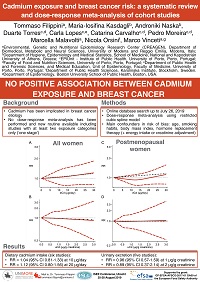Background and aim: Cadmium is a heavy metal which has been implicated in breast cancer etiology because of its toxic properties such as endocrine disruption. The general population is exposed to cadmium through dietary intake, cigarette smoking, emissions of motorized traffic and industrial facilities. We carried out a systematic review and dose-response meta-analysis of the cohort studies investigating the association between cadmium exposure and breast cancer risk, for which inconsistent results have been reported in the literature.
Methods: Following online database search up to January 2019, we carried out a dose-response meta-analysis to identify the relation between cadmium exposure and disease risk. We used a restricted cubic spline model and the ‘one-stage’ approach, stratifying for exposure assessment method and menopausal status.
Results: We identified 12 studies, 9 using breast cancer incidence and 3 mortality as an outcome. In six studies cadmium exposure was assessed through dietary questionnaires, in five through urinary excretion levels, and in one based on environmental air levels. Seven studies included post-menopausal women only. Overall, we observed a positive linear relation between breast cancer risk and dietary cadmium intake (relative risk (RR) 1.04, 95% confidence interval (CI) 0.81-1.33 at 10 µg/day, and RR 1.12, 95% CI 0.80-1.56 at 20 µg/day). On the converse, risk was not associated with urinary excretion. Analysis restricted to post-menopausal women showed a positive association between cadmium exposure assessed through either dietary intake and urinary excretion, for levels higher than 20 µg/day and 1.65 µg/g creatinine, respectively.
Conclusions: Our dose-response meta-analysis suggests that cadmium exposure may be positively and linearly associated with breast cancer risk. Results were, however, dependent on the method used to assess exposure. For post-menopausal women, the shape of the association suggests that a threshold of exposure may be needed to raise cancer risk.

